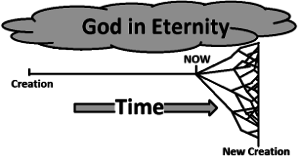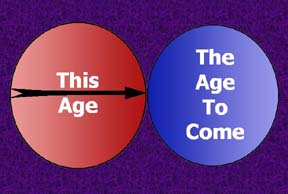 A recent conversation with a friend who conducts a weekly bible study gave me an idea for my blog: I can take an aspect of his weekly curriculum and present it here. Next week’s study will be about “eternity” which sounds, from a grammatical point of view, simplistically uninteresting but which takes on a completely different appeal when we realize that there is no biblical word for it, “eternity.”
A recent conversation with a friend who conducts a weekly bible study gave me an idea for my blog: I can take an aspect of his weekly curriculum and present it here. Next week’s study will be about “eternity” which sounds, from a grammatical point of view, simplistically uninteresting but which takes on a completely different appeal when we realize that there is no biblical word for it, “eternity.”
If you look for it in a concordance, search for “for ever.” In the Old Testament, one term refers to the passing of time, the duration of time, and thus, says the dictionary, “perpetuity of time,” or in our lingo: eternity.
The fear of the LORD is pure, enduring forever. Psalms 19:9
The dictionary then references another word we interpret as eternity in the Old Testament. It is defined as “hidden time, [a] long [time], the beginning or end of which is uncertain or else not defined.” There is one word used to define both Old Testament terms: perpetuity. Thus the ancients used both words in one phrase:
The LORD is King for ever [1st word] and ever [2nd word] Psalms 10:16
What they are actually saying is, “throughout time…” One scholar reminds us:
Hebrew equivalents for eternity are temporal to the extent that they do not signify things beyond [time or eternity] but things pertaining to this life. Because our idea of eternity is religiously colored, it is advisable to avoid this term when we want to translate Hebrew equivalents into our language and to translate them by means of the notion of “boundless time.” — Hebrew Thought Compared with Greek Thorleif Bowman p. 151
 This is why the word “forever” makes perfect sense to the ancients when a slave’s devotion to his master was “perpetual …forever” or throughout his lifetime. The NIV tidies this up for us by translating it “for life.” which is NOT what the Bible said but is what the Bible meant:
This is why the word “forever” makes perfect sense to the ancients when a slave’s devotion to his master was “perpetual …forever” or throughout his lifetime. The NIV tidies this up for us by translating it “for life.” which is NOT what the Bible said but is what the Bible meant:
Then his master must take him before the judges. He shall take him to the door or the doorpost and pierce his ear with an awl. Then he will be his servant for life [Hebrew: forever]. Exodus 21:6 NIV
In the Old Testament using this word to describe a servant’s faithful lifespan makes perfect sense. Does this mean that when the angel “swore by Him [God] who lives forever…” in Daniel 12:7 that God is not eternal!?
I heard him swear by him who lives forever …. Daniel 12:7
Of course not! In every sense possible God is eternal, forever and ever… It just has to be said within the limitation of a language (Old Testament Hebrew) that, in all honesty, does not have our word “eternal.” So David explains it this way [and you can read “eternal” into his thought]
Before the mountains were born or you brought forth the whole world, from everlasting [time immemorial] to everlasting [time in perpetuity] you are God. Psalm 91:2 NIV
The grass withers and the flowers fall, but the word of our God endures [is established] forever. [God’s Word is not transitory] Isa 40:8 NIV
(God’s Word is NOT true now or then, but consistently and always true and applicable to the conduct of a holy life as long as time endures … and beyond.) Bowman notes the “The Hebrews simply think of the matter in an entirely different way.” [Page 154] And it is this difference we hope to show shortly.
The New Testament word for forever is our word eon, “age” Jude said it right:
To the only God our Savior be glory, majesty, power and authority, through Jesus Christ our Lord, before all ages, now and forevermore! [into all ages] Amen. Jude 25 NIV
 This is what one scholar refers to as the “boundless Beyond,” from the ages to the ages to come, i.e. forever and ever. [Ephesians 2:7] But this is still “the aggregate of things contained in time.” [Thayer’s Dictionary]
This is what one scholar refers to as the “boundless Beyond,” from the ages to the ages to come, i.e. forever and ever. [Ephesians 2:7] But this is still “the aggregate of things contained in time.” [Thayer’s Dictionary]
The New Testament sees two ages: the present [Galatians 1:4] and the one to come [Ephesians 2:7].
“The ages to come” becomes a metaphor for eternity, even though—think about it—we are using a term, “age,” that is bounded. In other words, it has a beginning and an end date. It makes good Greek but lousy Bible.
“Truly I tell you,” Jesus said to them, “no one who has left home or wife or brothers or sisters or parents or children for the sake of the kingdom of God will fail to receive many times as much in this age, and in the age to come eternal life [ageless life]” Luke 18:29-30
The Greek language is not only tied to “time” – a time period, but it envisions a PERIOD of time. As such the word often in the New Testament refers to this world (38 times in the King James) and is compared to the present time. Look at another translation of Luke 18:30
…who shall not receive manifold more in this time, and in the world to come eternal life. ASV
This age to come is the same as the world to come [Mark 10:30].
The simple truth is that we have no word for the time to come. Bowman concluded, “The glory of this world is nothing compared to the glory of eternity.” [Page 155]
… as it is written: “What no eye has seen, what no ear has heard, and what no human mind has conceived”— the things God has prepared for those who love him – 1 Corinthians 2:9 NIV
Think about it: Our Bible was not written to describe heaven to us. The Bible was written to equip us for our spiritual sojourn through this life to live victoriously over sin and follow Christ. [2 Peter 1:3].
 When we talk of happiness, we think of heaven, but that was not Jesus’ emphasis. His was the sermon on the mount and the “Beatitudes” which is the way to happiness in this life – in this world or age.
When we talk of happiness, we think of heaven, but that was not Jesus’ emphasis. His was the sermon on the mount and the “Beatitudes” which is the way to happiness in this life – in this world or age.
Look at the timeline of Scripture. We begin to read in Genesis 1:1 “In the beginning … (of time). God begins by creating time. The Bible ends in Revelation 22:5 with the removal of the sun and moon God created in Genesis 1. This marks the end of time and the beginning of …eternity. The text in between is this life …as it should be …as it must be!
When it comes to the life to come? Jesus reassuringly consoled,
“Do not let your hearts be distressed. You believe in God; trust me….” John 14:1
How can we be sure that what is eternal is really eternal?
There is another word used only 3 times in our New Testament that makes all this plain. Time is only useful as a measurement while death reigns, because time measures decay, entropy, the running down and dying of all things. So we look for a non-death or in our language: immortality.
Is God eternal then? You answer this:
God, the blessed and only Ruler, the King of kings and Lord of lords,who alone is immortal and who lives in unapproachable light, whom no one has seen or can see. To him be honor and might forever. Amen. I Timothy 6:14-15
And what about us? Is not this the glorification of the body?
…those he called, he also justified; those he justified, he also glorified. Romans 8:30
For the perishable must clothe itself with the imperishable, and the mortal with immortality.When the perishable has been clothed with the imperishable, and the mortal with immortality, then the saying that is written will come true: “Death has been swallowed up in victory.” I Corinthians 15:53-54
In our Old Testament the prophet prclaims, “He will swallow up death forever.” [Isaiah 25:8 ] We don’t need the work “forever” since when death is no more we have entered eternity.
But my favorite verse is something Jesus promised:
Jesus said to her, “I am the resurrection and the life. The one who believes in me will live, even though they die; and whoever lives by believing in me will never die.” John 11:25-26


